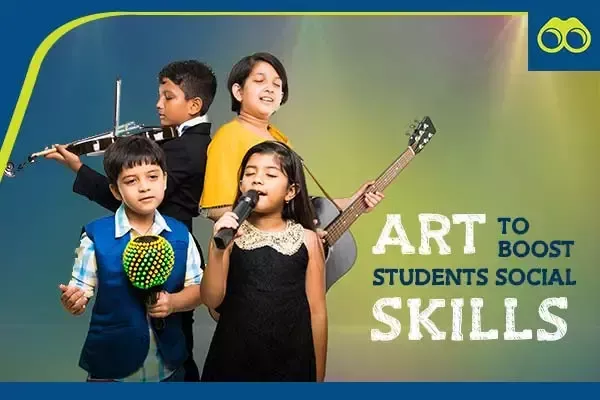Category: Recommendation

In the ever-evolving world of education, attempting new and revolutionary approaches can make a big difference in how students study and grow. One such method that is gaining attention is bringing art into the classroom. This creative journey has the ability to open up thrilling new ways of gaining knowledge, encourage students to express themselves, and create a warm and inclusive environment for everybody. This article explores how art can transform the schooling experience. We'll read about the power of artistic expression to enrich the lives of the students. From music and painting to acting and storytelling, we will see how these diverse artwork forms can improve the academic journey, spark creativity, and support emotional well-being, leaving an enduring impact on young learners.
The incorporation of 7 various types of art into the classroom experience is of paramount importance as it enriches training in multifaceted ways. Music, acting, singing, painting, dancing, poetry, and storytelling not only stimulate creativity but also enhance cognitive skills, emotional expression, and social interaction. These art forms foster a dynamic and engaging learning environment, encouraging students to explore their thoughts and emotions whilst developing empathy, collaboration, and communication. By embracing these artistic dimensions, learning becomes holistic, nurturing well-rounded folks who are not only academically proficient but also socially and emotionally adept, poised to excel in an ever-evolving world. Let's delve into the seven forms of artwork that contribute to student's educational objectives and their holistic learning experience.
Teachers can consider organising role plays in the classroom. To help students learn how to behave appropriately in a variety of situations, students get to practise this in class. It's like a fun game where they can use their imaginations to express their emotions. When students share their personal experiences, the teacher uses role-playing to teach them how to handle challenging circumstances.
Singing is a great form of art to indulge in. Students can come together and express themselves in a unique way through singing. When they transition from one lesson to the next or celebrate successes, they enjoy singing songs that inspire them. They occasionally discuss the songs' meanings or appealing qualities. All day, songs spread joy throughout their classroom.
Students have a great time drawing. They draw for various reasons, such as to demonstrate what they have learned or to convey their hopes and joy. Art is also used for assignments in classes. Students are encouraged to collaborate on large-scale artistic endeavours like creating murals on the walls, creating kindness and empathy signs, and drawing illustrations to accompany their writing.
In the classroom, teachers like to play music that the students like. They create a playlist after asking students to share their top songs at the start of the academic year. The fact that a different student chooses a song each day makes the class more upbeat and keeps the students interested and attentive. Even a brief musical interlude can have a significant impact.
Students get very excited when they have the chance to dance to their favourite songs. They are joyful and content because of it. Teachers can discover more about their students' personalities through dancing. Who is timid and who is self-assured can be seen. It's fascinating to see how everyone incorporates their individual dancing styles into a single, distinctive group.
Poetry is a fun way to encourage students to read, learn, remember, and comprehend language. Poetry teaches students about human expression and the reasons behind it. Some poems can also brighten someone's day. It is encouraged for students to memorise their favourite poems and, if they so choose, to share them with their friends. It's obvious that students feel confident when they share their poetry. They can express themselves in new ways through it.
Teachers make learning enjoyable by holding "personal treasure days," essentially online versions of show-and-tell. Students must bring something in a bag, and their fellow students must guess what it is. After that, the student tells a story about the item, and the other students can ask questions. Students and teachers can learn more about one another and from each other through this type of storytelling.
Read more: Importance of Conducting Co-Curricular Activities in Schools
Wrapping Up:
Art is a vital tool to enhance student’s social skills. It is not only an enjoyable approach but also an effective one. Through various artistic mediums like singing, acting, poetry, and more, schools can make lessons more interesting, making knowledge trader effortless. By encouraging them to work collaboratively on art projects, one can provide them with opportunities for self-reflection and becoming more socially adept individuals. As a prominent link between schools and students, Skoodos streamlines the school selection process while maintaining fairness and effectiveness. The school search engine is an ideal platform for gathering specific information about various schools from different regions and learning about their features and attributes.
 Blog: Recently Added
Blog: Recently AddedIf you’re a parent in India today, you’ve probably heard about NEP 2020, but you may still be w...
Every parent who is looking at schools today eventually asks this question: If we don’t live in...
Every parent reaches a point where this question quietly starts coming up: Should we consider boardi...
For many families in India, choosing a school is one of the most important long-term decisions they...
For years, higher education in India came with an almost unspoken rule: if you want a “good” de...
For most parents, choosing a school isn’t just an academic decision; it’s emotional, stressful, and...
Deciding on a school today is quite different from what it was a decade ago. Parents are not just co...
While making a decision about a school is not a very easy task, it is now more complex.While making...
Selecting the proper school has never been an easy task. For parents of Indian children, it is often...
A decade ago, school admissions were characterised by queues, forms, physical counselling, and limit...

